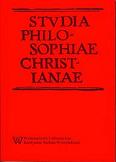"Homo non est intellectus". Aquinas about relation between soul and intellect
"Homo non est intellectus". Aquinas about relation between soul and intellect
Author(s): Michał ZembrzuskiSubject(s): Philosophy, History of Philosophy, Philosophy of Middle Ages
Published by: Wydawnictwo Naukowe Uniwersytetu Kardynała Stefana Wyszyńskiego w Warszawie
Keywords: Aquinas; intellect; soul–body problem; impediment argument; hylomorphism; whole–part relation
Summary/Abstract: This paper discusses Thomas Aquinas’ stance on the relation between intellect and human soul, where the former is a power and the latter its principle. Due to the fact that Aquinas understands soul as the form of a body, rather than its mover, the problem of how to separate and characterize intellective powers arises. For it is accidental intellectuality that enables cognitive and volitional acts, which are independent of body in their essence. To explain his own position, Aquinas employs the so-called “impediment argument” for the spirituality of the human intellect. He also employs the whole/part distinction when discussing the relation between intellect and soul as whole/part categories. As a result, his account can avoid Averroistic flaws without having to identify intellect with the soul or the whole human being (as argued by Albert the Great). M. Gogacz’s thesis that the intellectual accident of the soul is identical with the possible intellect seems to solve the problem of the accidental and potential character of this particular human power.
Journal: Studia Philosophiae Christianae
- Issue Year: 53/2017
- Issue No: 4
- Page Range: 75-101
- Page Count: 27
- Language: English

